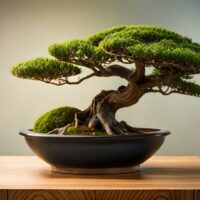Feng-Shui plants are an essential element in gardening and home decor. They are not just ordinary plants, but they are carefully chosen based on their ability to bring balance and harmony to your surroundings. Feng-Shui plants have been used for centuries in Chinese culture to create a harmonious and peaceful environment. In this article, we will explore the importance of Feng-Shui plants in your garden, their significance in Chinese culture, how they influence your life energy, the best plant species for a Feng-Shui garden, how to choose the right plants, the colors and shapes they should have, how to care for them, their role in terrace and balcony design, how to use them in your home, and other tips for creating a harmonious atmosphere.
Zusammenfassung
- Feng-Shui Pflanzen sind wichtig für deinen Garten, um eine harmonische Atmosphäre zu schaffen.
- In der chinesischen Kultur haben Feng-Shui Pflanzen eine große Bedeutung für das Wohlbefinden.
- Feng-Shui Pflanzen beeinflussen deine Lebensenergie positiv und können Stress reduzieren.
- Besonders geeignet für den Feng-Shui Garten sind Pflanzen mit runden Blättern und sanften Farben.
- Um die richtigen Feng-Shui Pflanzen auszuwählen, solltest du dich an den fünf Elementen orientieren.
Why are Feng-Shui plants important for your garden?
Feng-Shui plants play a crucial role in bringing balance and harmony to your garden. They have the ability to create a peaceful and calming atmosphere that can help you relax and unwind. By incorporating Feng-Shui plants into your garden, you can create a space that is not only visually appealing but also promotes positive energy flow. These plants have been carefully selected based on their ability to enhance the energy flow in your surroundings.
Having Feng-Shui plants in your garden has numerous benefits. They can help reduce stress and anxiety, improve air quality, and create a sense of tranquility. These plants are known for their ability to purify the air by removing toxins and releasing oxygen. They also have a calming effect on the mind and body, which can help improve your overall well-being. Additionally, Feng-Shui plants can attract positive energy and abundance into your life.
What is the significance of Feng-Shui plants in Chinese culture?
Feng-Shui is an ancient Chinese practice that dates back thousands of years. It is based on the belief that everything in the universe is connected and that the energy flow, or chi, can be influenced by the arrangement of objects in our surroundings. Feng-Shui plants are an integral part of this practice and are used to create a harmonious and balanced environment.
In Chinese culture, gardens are considered a reflection of the natural world and are designed to bring balance and harmony to one’s life. Feng-Shui plants are carefully chosen based on their ability to enhance the energy flow in the garden. They are placed strategically to create a sense of balance and tranquility. These plants are believed to attract positive energy and bring good fortune to the inhabitants of the garden.
How do Feng-Shui plants influence your life energy?
Feng-Shui plants have a profound impact on your life energy. They can affect your mood, well-being, and overall quality of life. These plants have the ability to create a sense of calm and tranquility, which can help reduce stress and anxiety. By incorporating Feng-Shui plants into your home and garden, you can create a space that promotes positive energy flow and enhances your overall well-being.
Having Feng-Shui plants in your home and garden has numerous benefits. They can improve air quality by removing toxins and releasing oxygen. This can have a positive impact on your physical health and help you breathe easier. Additionally, these plants have a calming effect on the mind and body, which can help improve your mental well-being. They can also attract positive energy and abundance into your life, creating a sense of harmony and balance.
What plant species are best suited for a Feng-Shui garden?
There are several plant species that are commonly used in Feng-Shui gardens. Each plant species has its own unique qualities and characteristics that contribute to the overall balance and harmony of the garden. Some of the most popular plant species for a Feng-Shui garden include bamboo, orchids, bonsai trees, money trees, and lucky bamboo.
Bamboo is considered a symbol of strength and resilience in Chinese culture. It is believed to bring good luck and prosperity to the garden. Bamboo is also known for its ability to purify the air and create a sense of calm and tranquility.
Orchids are another popular choice for a Feng-Shui garden. They are considered a symbol of love, beauty, and fertility. Orchids are believed to attract positive energy and create a sense of harmony in the garden.
Bonsai trees are miniature trees that are carefully pruned and shaped to create a sense of balance and harmony. They are believed to bring good luck and prosperity to the garden. Bonsai trees require special care and attention, but they can be a beautiful addition to any Feng-Shui garden.
Money trees, also known as Pachira aquatica, are believed to bring wealth and abundance to the garden. They have a unique braided trunk and are often placed near the entrance of the garden to attract positive energy.
Lucky bamboo is another popular choice for a Feng-Shui garden. It is believed to bring good luck and prosperity to the garden. Lucky bamboo is easy to care for and can be grown in water or soil.
How can you choose the right Feng-Shui plants for your garden?

Choosing the right Feng-Shui plants for your garden is essential to create a harmonious and balanced environment. There are several factors to consider when selecting plants for your garden, including your needs, preferences, and the specific energy you want to attract.
First, consider your needs and preferences. Think about what you want to achieve with your garden and what kind of energy you want to attract. Do you want a peaceful and calming space? Or do you want a vibrant and energetic atmosphere? Once you have identified your needs, you can choose plants that align with those goals.
Next, consider the specific energy you want to attract. Different plants have different qualities and characteristics that can influence the energy flow in your garden. For example, if you want to attract wealth and abundance, you may choose plants like money trees or lucky bamboo. If you want to create a sense of calm and tranquility, you may choose plants like bamboo or orchids.
It is also important to consider the specific requirements of each plant species. Some plants require more sunlight, while others thrive in shade. Some plants require more water, while others prefer drier conditions. Make sure to choose plants that are well-suited to your garden’s climate and conditions.
What colors and shapes should Feng-Shui plants have?
The colors and shapes of Feng-Shui plants can have a significant impact on the energy flow in your garden. Different colors and shapes are believed to have different qualities and characteristics that can influence the energy flow in your surroundings.
In general, it is recommended to choose plants with rounded or flowing shapes, as they are believed to create a sense of calm and tranquility. Plants with sharp or spiky shapes are believed to create a sense of tension and should be avoided.
When it comes to colors, there are specific meanings associated with each color in Feng-Shui. For example, green is associated with growth and vitality, while red is associated with passion and energy. Blue is associated with calmness and tranquility, while yellow is associated with happiness and abundance. Choose colors that align with the specific energy you want to attract in your garden.
How can you best care for your Feng-Shui plants?
Proper care is essential to ensure the health and longevity of your Feng-Shui plants. By taking good care of your plants, you can enhance the energy flow in your garden and create a harmonious atmosphere.
First, make sure to provide your plants with the right amount of sunlight. Some plants require more sunlight, while others prefer shade. Make sure to place your plants in an area that receives the appropriate amount of sunlight for their specific needs.
Next, make sure to water your plants regularly. Different plants have different water requirements, so make sure to water them accordingly. Overwatering or underwatering can have a negative impact on the health of your plants.
It is also important to provide your plants with the right type of soil. Some plants prefer well-draining soil, while others prefer more moisture. Make sure to choose the right type of soil for each plant species and provide them with the appropriate nutrients.
Lastly, make sure to prune and trim your plants regularly. This will help promote healthy growth and prevent overcrowding. Pruning and trimming can also help shape your plants and create a sense of balance and harmony in your garden.
What role do Feng-Shui plants play in the design of terraces and balconies?
Feng-Shui plants can be used to create a harmonious atmosphere on terraces and balconies. These outdoor spaces are often limited in size, so it is important to choose plants that are well-suited to the space.
When designing a terrace or balcony, consider the specific energy you want to attract. Do you want a peaceful and calming space? Or do you want a vibrant and energetic atmosphere? Once you have identified your goals, you can choose plants that align with those intentions.
Consider the size and shape of your terrace or balcony when choosing plants. If you have a small space, choose plants that are compact and don’t require a lot of room to grow. Hanging plants or vertical gardens can be a great option for small spaces.
It is also important to consider the specific requirements of each plant species. Some plants require more sunlight, while others thrive in shade. Some plants require more water, while others prefer drier conditions. Make sure to choose plants that are well-suited to the specific conditions of your terrace or balcony.
How can you use Feng-Shui plants in your home?
Feng-Shui plants can be used to enhance the energy flow in your home and create a harmonious atmosphere. They can be placed in various areas of your home, including the living room, bedroom, kitchen, and bathroom.
In the living room, Feng-Shui plants can be used to create a sense of calm and tranquility. They can be placed near windows or in corners to attract positive energy and create a peaceful atmosphere. Plants with rounded or flowing shapes are recommended for the living room, as they are believed to create a sense of harmony.
In the bedroom, Feng-Shui plants can be used to promote relaxation and restful sleep. They can be placed on bedside tables or near windows to create a calming and soothing atmosphere. Plants with soft colors, such as green or blue, are recommended for the bedroom, as they are believed to promote tranquility.
In the kitchen, Feng-Shui plants can be used to create a vibrant and energetic atmosphere. They can be placed on countertops or near windows to attract positive energy and promote abundance. Plants with bright colors, such as red or yellow, are recommended for the kitchen, as they are believed to promote energy and vitality.
In the bathroom, Feng-Shui plants can be used to create a sense of calm and tranquility. They can be placed on countertops or near windows to create a spa-like atmosphere. Plants that thrive in humid conditions, such as orchids or ferns, are recommended for the bathroom.
What other tips are there for creating a harmonious atmosphere with Feng-Shui plants?
There are several other tips for creating a balanced and harmonious atmosphere in your garden and home using Feng-Shui plants.
First, make sure to keep your plants clean and free from dust. Dust can block the energy flow and have a negative impact on the health of your plants. Regularly wipe the leaves of your plants with a damp cloth to keep them clean and healthy.
Next, consider the placement of your plants. Feng-Shui plants should be placed strategically to create a sense of balance and harmony. They can be placed near entrances or in corners to attract positive energy and create a peaceful atmosphere.
It is also important to regularly rotate your plants. This will help ensure that all sides of the plant receive equal sunlight and promote healthy growth. Rotating your plants can also help create a sense of balance and harmony in your garden or home.
Lastly, make sure to regularly check for pests and diseases. Pests and diseases can have a negative impact on the health of your plants and disrupt the energy flow in your surroundings. Regularly inspect your plants for any signs of pests or diseases and take appropriate action to prevent further damage.
In conclusion, Feng-Shui plants play a crucial role in gardening and home decor. They have the ability to bring balance and harmony to your surroundings and enhance the energy flow in your garden and home. By carefully selecting the right plants, considering their colors and shapes, and providing them with proper care, you can create a harmonious atmosphere that promotes positive energy flow. Incorporating Feng-Shui plants into your life can have numerous benefits, including reducing stress and anxiety, improving air quality, and attracting positive energy and abundance. So why not bring some balance and harmony into your life by incorporating Feng-Shui plants into your garden and home?
Hey du! Wenn du dich für Feng-Shui Pflanzen interessierst und wissen möchtest, wie du die richtige Auswahl für deinen Garten treffen kannst, dann solltest du unbedingt diesen Artikel über die fünf Feng-Shui-Elemente im Garten lesen. Hier erfährst du, welche Pflanzen am besten zum Wasserelement passen und wie du mit den verschiedenen Elementen eine harmonische Atmosphäre in deinem Garten schaffen kannst. Also klick dich rein und lass dich inspirieren! Hier geht’s zum Artikel.
FAQs
Was sind Feng-Shui Pflanzen?
Feng-Shui Pflanzen sind Pflanzen, die nach den Prinzipien des Feng-Shui ausgewählt und platziert werden, um eine positive Energie in deinem Garten oder Zuhause zu schaffen.
Welche Pflanzen sind für den Garten geeignet?
Es gibt viele Pflanzen, die für den Garten geeignet sind, wie zum Beispiel Bambus, Lavendel, Rosen, Jasmin und Zitronenbäume. Es ist jedoch wichtig, dass du die Pflanzen entsprechend deiner Umgebung und deiner persönlichen Vorlieben auswählst.
Wie wähle ich die richtigen Feng-Shui Pflanzen aus?
Du solltest Pflanzen auswählen, die eine positive Energie in deinem Garten oder Zuhause schaffen. Dazu gehören Pflanzen mit runden Blättern, die das Chi (Lebensenergie) anziehen, sowie Pflanzen mit aufrechtem Wuchs, die Stabilität und Sicherheit symbolisieren.
Wie platziere ich die Feng-Shui Pflanzen in meinem Garten?
Du solltest die Pflanzen entsprechend ihrer Bedeutung und deiner persönlichen Vorlieben platzieren. Zum Beispiel solltest du Pflanzen mit runden Blättern in der Nähe von Wasser platzieren, um das Chi anzuziehen, während du Pflanzen mit aufrechtem Wuchs in der Nähe von Eingängen oder Wegen platzieren solltest, um Stabilität und Sicherheit zu symbolisieren.
Welche Vorteile haben Feng-Shui Pflanzen?
Feng-Shui Pflanzen können eine positive Energie in deinem Garten oder Zuhause schaffen und dazu beitragen, dass du dich glücklicher und ausgeglichener fühlst. Sie können auch dazu beitragen, dass du dich besser konzentrieren und produktiver arbeiten kannst.













